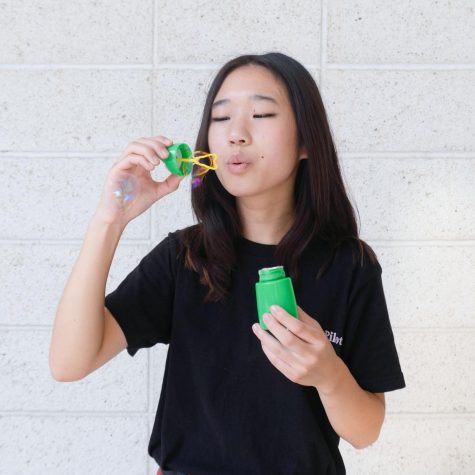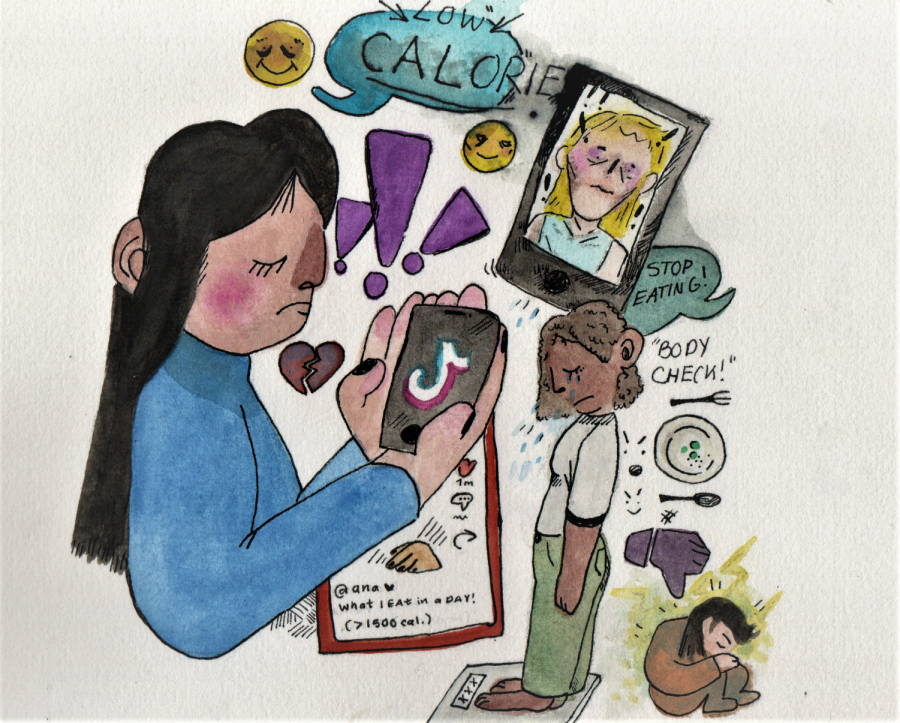Putting an End to the Popularization of ‘Pro-Ana’
According to the National Association of Anorexia Nervosa and Associated Disorders, eating disorders are the second most deadly category of mental illnesses, causing over 10,000 deaths each year. These numbers are only supported by the normalization of harmful behaviors on social media, such as sharing “target weights,” participating in group fasts and publicly criticizing bigger bodies.
Content warning: This article contains descriptions of eating disorders and links to external resources that may contain triggering images and content regarding eating disorders and mental illness.
In an age of photoshopped Instagram models and miracle weight-loss pills, it can be especially difficult for internet users to separate fact from fiction. Nowhere is this phenomenon more pronounced than in the promotion of eating disorders, whose roots in dietary blogs and online bulletin boards have since taken hold in networking platforms like TikTok and Twitter.
These communities, often dubbed “pro-ana” or pro-anorexia, make unhealthy eating habits seem attractive by posting trendy food videos and workout routines. However, audiences should be wary of how social media encourages a culture of disordered eating and make a conscious effort to educate themselves on its effects through dedicated research.
Eating disorders are competitive illnesses that involve severe disturbances in a person’s thoughts, emotions and behaviors regarding food, according to the National Institute of Mental Health.
Though eating disorders and the internet have always had a tumultuous relationship, a surge of body positivity has partially combatted these negative attitudes in recent years. But with the popularization of TikTok and Twitter, pro-ana has undergone a bastardized renaissance in a new generation of susceptible teenagers.
Twitter threads comparing thigh gaps and flaunting restrictive meal plans have experienced a revival. And while the current trend of reposting videos of TikTok creators as “thinspiration” (a portmanteau of “thin” and “inspiration”) may seem flattering, the reality is that labels like these cause discomfort and distress for the individuals subjected to this idolization.
“I’ve gotten countless DMs from people telling me that my pictures and videos are being spread around on ‘eating disorder Twitter,’ and it makes me feel like absolute crap,” creator Rui Gao (@funkyfitz) said in a TikTok. “I am not comfortable with people using me as ‘thinspo.’ I do not want other people to use my content to promote eating disorders.”
To some, this problem may sound negligible; there seem to be so many greater issues vying for our attention. But this acute underestimation of the severity of eating disorders is precisely why they are so destructive.
“A lot of the videos I have watched [on TikTok] are promoting dangerous behaviors that can trigger a lifetime struggle with food,” registered dietitian Abbey Sharp said in a YouTube video. “Healthy eating and nutrition is so nuanced. You cannot expect to get the full story in 15 seconds.”
Nothing contributes more heavily to the prevalence of eating disorders than a culture that disparages fat bodies and venerates thin ones. To worship and scrutinize a “skinny” lifestyle is to enable the spread of misinformation. When coupled with the fact that online audiences are becoming increasingly younger—according to the National Telecommunications and Information Administration, by the age of 10, young people are more likely to use the internet than any adult over 25—pro-ana beliefs have lethal potential.
“Recently, I’ve been getting a lot of videos on my For You page about dieting and diet culture,” junior Grace Sulaimane said. “I also see a lot of things on Instagram … I think it’s toxic. I feel like some people could get the wrong idea, especially if they’re not really educated.”
It can be hard to recognize the warning signs of an eating disorder, and even harder to take the necessary steps toward recovery. Being cognizant of media influence on your behavior can prevent you from ever reaching that point.
Take time to identify how the internet affects your perception of yourself, and be aware of the content you produce for your peers. Diet culture will not disappear overnight: it is our obligation to create a safer space for ourselves and our responsibility to foster one in the next generation.
If you are interested in learning more about these topics, here are some additional resources on eating disorders and body positivity:
Your donation will support the student journalists of Portola High School. Your contribution will allow us to purchase equipment and cover our annual website hosting costs.

Lauren Hsu is your Opinion Editor and Co-Social Media Manager for her third and final year on the Pilot staff. She is looking forward to making even more...

Nate Taylor is the 2021-22 front page editor and photo editor. He is ready to improve his design skills and create memorable Portola Pilot front covers....




